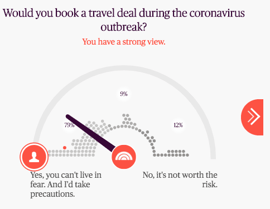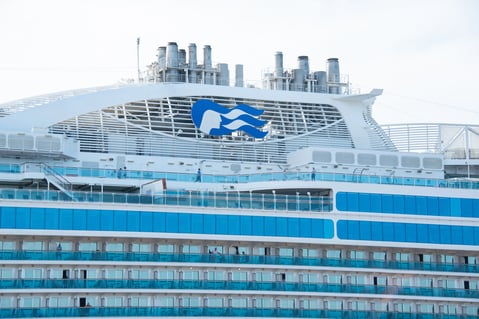Tourism and coronavirus: what travel marketers need to know
March 11, 2020
As the news fills up with stories of cancelled events, quarantined cruise ships, empty airports, and ghost flights due to coronavirus, travel marketers both at home and around the world are scrambling to figure out the best course of action.
Now, there's much we simply don't know, and no way to predict what the coming months will bring. That said, the silver lining right now is that, despite a rash of last minute cancellations, many people continue to seek out ways to travel, and that doesn't look likely to change, at least for time being. Indeed, a live March 11 NBC poll showed only 12% of respondents answering "no" when asked if they'd book travel at this time:

Indeed, for some audiences this is actually shaping up to be an ideal time to plan an book travel. So, what are travel brands to do? Here's our look at the best guidance we've uncovered for dealing with this unprecedented situation.
Accept that lower demand means lower prices
There's no getting around the fact that when demand dips for any reason, prices follow. Airlines have already announced major fare sales to boost bookings, with many hotel brands and resorts following suit. Most of these sales are mainly for travel leading up to the summer high season, a sign that brands are hopeful conditions will have returned to normal by then.
Any travel brand concerned about bookings should expect to stay competitive with deals and promotions in the short term as a bridge into the peak seasons to come.
Be proactive
It's critical that tourism marketers stay ahead of the situation. There are willing audiences of travelers out there actively seeking deals, and marketers are wise to engage them. Arizona Tourism, for example, launched its "Unreal Spring Deals" promotion that includes up to 50% off hotel rooms. Disney is promoting cheap room rates at a fraction of their typical prices. And luxury travel advisory Embark Beyond is spreading the word among its customers that now is a great time to take advantage of lower rates and fares.
Focus on younger travelers
While lower prices alone won't compel travel among all audiences, there are signs that younger Generation Z and Millennial travelers are keen to take advantage of the savings. Some have shifted away from overseas travel to cheaper options at home, while others see half-off airfares to places like New Zealand as too good to pass up. Even a cursory glance through social media these days reveals a generational divide when it comes to travel in the era of COVID-19.
Think closer audiences, shorter stays
"Getaway" road trips are already the preferred way to go for young, cash strapped families. With anxieties on the rise about cruises, overseas destinations and air travel, look for many more people to turn to domestic road trips as a means of getting away. That means that destination marketers should focus more on promoting shorter stay options to audiences within an easy day drive. And as "social distancing" becomes the norm, emphasizing destinations and experiences that don't force people into close contact should also be emphasized.
Show them you get it
One of the best things marketers can do right now is let potential guests know how they're planning to keep people safe. Wynn Resorts in Las Vegas, for example, has announced revised internal health guidelines to the public in an effort to instill confidence. Destination, hotel, and resort brands can learn from the cruise industry's mistakes in this regard by making it clear just what to expect when travelers visit.
Airlines, understanding the anxiety that comes with committing to travel in these uncertain times, are waving change fees in an effort to allay concerns. Southwest Airlines has taken it a step further by waving cancellation fees as well during its latest fare sale. The message? You can book and save without worry.
Perhaps the most important thing to consider is that this is a fluid, ever-changing situation. Make sure your marketing approach is focused on weathering uncertainty today, without doing lasting harm down the road. According to Skift, as of mid March, over 80% of US travelers still intended to take previously planned trips. While there's no doubt travel is taking real hit, that doesn't mean travel brands have to take things lying down.
Looking for help with tourism marketing in uncertain times? Contact the experts at Slingshot today.




